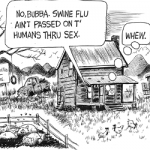[Thomas, through his books and blog and social media posts, has long been a champion of historical truth when it comes to the feud era and its people. He is also, however, a champion of the Appalachian people in general. The newspaper writing in the immediate wake of the raid on the McCoy home was devastating in the long-term effects it had upon how mountain people were perceived by the broader American public. These articles, whose writers for the most part knew they were false the moment they wrote them, painted an image of mountain people for audiences in Pittsburgh, Boston, New York, etc. as rough and dirty savages, half-crazed on moonshine and eager to shoot each other down over the most trifling of events. Few people knew, or cared to know, that this region was in fact a place where, other than during the years of the Civil War, murder was almost unknown. The people were, as Altina Waller correctly described them, rough and tumble, but far from being lawless gunslingers they were in fact quick to take even relatively small issues to court. And, in case after case that Thomas has examined in the documents, people complied with the judgements of the court. The records are clear that the people of the Tug Valley, at least prior to the coming of the railroads and coal companies, displayed an enormous respect for the law. –RH]
Several of my friends and relatives have asked me why I devoted many months of my life to writing a “feud book,” at a time when my life expectancy could be numbered in months. I thought I had made that clear in my introduction, where I wrote: “The feud story was a creation of the big city newspapers. The immediate purpose for its creation was to devalue the people and thereby facilitate the transfer of ownership of the wealth of the Valley to the same big city financiers who controlled those newspapers. The ultimate purpose was to transform the independent mountaineers into docile and willing wage workers. This transformation was abetted by the state governments and the elites on both the state and local levels, who hoped to profit by the transformation.”
At the end of the book I wrote: “I believe that there was a purpose for sending the New York reporters to our area instead of to the other parts of Kentucky where much larger feuds were underway. The purpose was to present the people of the Tug Valley as semi-savage barbarians, thus rendering the taking of their mineral riches more palatable to the American public.”
I also wrote that I believe the recent revival of the feud story, in an even more super-sized form, leads me to believe that the public is being prepared for the destruction coming soon from the fracking of the Marcellus shale, which underlies over 90% of West Virginia.
Betty Cloer Wallace made my points much better than I can in a column she wrote for an Asheville, North Carolina paper five years ago.
https://mountainx.com/opinion/050609fighting_back/
The column was Ms. Wallace’s response to one of Bill O’Reilly’s “pseudo-smart” monologues on the subject of hillbillies, and an atrocious cartoon carried in that same paper. The cartoon:
Ms. Wallace wrote: “Bill O’Reilly’s recent denunciation of Appalachian-Americans on FOX News is only the latest example of the widespread, multigenerational problem of Appalachian hillbilly stereotypes. Quite simply, O’Reilly once again reminded the world that Appalachian mountain natives are the only group in America that many people still have the audacity to publicly ridicule as being ignorant—and worse.
“O’Reilly even expanded the historical litany of hillbilly stereotypes to include our being drug-addicted, hopelessly beyond social and moral redemption, and unworthy to live in our own mountain homeland. Appalachian children, he says, should move to Miami to save themselves….
“How can we overcome the pervasive hillbilly stereotypes that have demoralized us for more than a century and that continue to impact both our economic well-being and our children’s future? Why are we so reluctant to pick up pine knots and go to war against such blatant, insidious misrepresentation of our culture? Why do we continue to pull in our heads like turtles and pretend that we don’t care, that we’ll survive regardless of what the outside world thinks?
Well, I do care—for myself, my family and friends, and my culture—and I don’t believe we’re surviving very well now or will survive with a shred of honor and dignity in the future unless we rise up, en masse, and protest this kind of abuse at every opportunity.”
The following quotes from Ms. Wallace are gleaned from several of her responses to comments following the article.
“Yes, O’Reilly himself is small potatoes, merely a media mouthpiece and irritant, but thousands of people worldwide do believe him and others of his kind, and therein lies the problem with our future and the future of our children and grandchildren–if we do not pick up our pine knots and go to war to stamp out this terrible misrepresentation of our culture.
“This isn’t about our own perception of ourselves. We know who we are. It’s about how the rest of the world — encouraged by entertainment media and assorted other opportunists — have scapegoated us and continue to ridicule us while we just roll over and play dead or pretend we are “proud” to be deemed stupid and worse, as per that denigrating cartoon referenced above. Ultimately we bequeath these injustices and economically crippling stereotypes to our children, who deserve better. Other groups have gone to war to stamp out such negative racial and ethnic and cultural stereotypes, and they have succeeded in making it politically incorrect to produce bad movies and insulting cartoons or even to speak grossly insensitive language such as “step-n-fetchit,” “nigger,” “injun,” “dago:” need I go on? We should demand respect for ourselves and for our children.”
As some well-known politicians, who don’t really believe it say, “It really is all about the children”–and generations yet unborn
Reporting on a conference she attended, Wallace wrote: “The professor actually agreed with me, but the other participants did not want to hear that. They wanted to talk about feudists and snake-handlers and lawless heathens skulking around in the mountain fastnesses—and how such people were surely still around if only they could root them out and meet them.”
For a century and a quarter those outside writers failed to “root them out and meet them.” In 2013, Dean King finally did it, with his ludicrous yarn about how he and his teenage daughter, along with two forest rangers, were fired upon TWICE, in 2009 and 2010.
Wallace further says: “Ultimately EVERYONE who lives here, native or otherwise, is damaged with such blatant stereotypes that hinder the positive growth and reputation of the region…. Further compounding the problem, too many of our local governments are now made up of second-rate pseudo-leaders who are interested primarily in promoting tourism at any cost. But who, we might ask, will own the new hotels and mountaintop second-homes and assorted eateries the appointed tourist boards and self-serving chambers of commerce say we need—and who will be paying increased taxes for infrastructure to support them, and who will be cleaning their rooms and waiting their tables and manicuring their lawns?
Southern Appalachian people have tried to overlook blatant cultural stereotypes for over a century to no avail. Trying to ignore the insult and taking a “step-n-fetchit” response has reinforced it and perpetuated it in the minds of so many people that they think it is all right to continue the insult.
Simply ignoring it and allowing it to continue in such a blatant manner is an awful legacy of submission to leave to our children and grandchildren.”
In the year since my book came out, I have discovered that the “step-n-fetchits” greatly outnumber the people who are willing to take up a pine knot and go to war for themselves and their posterity.

